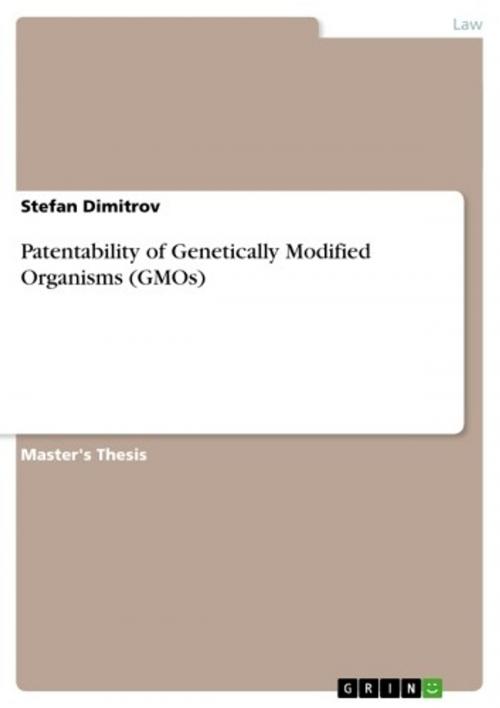| Author: | Stefan Dimitrov | ISBN: | 9783638192330 |
| Publisher: | GRIN Publishing | Publication: | May 15, 2003 |
| Imprint: | GRIN Publishing | Language: | English |
| Author: | Stefan Dimitrov |
| ISBN: | 9783638192330 |
| Publisher: | GRIN Publishing |
| Publication: | May 15, 2003 |
| Imprint: | GRIN Publishing |
| Language: | English |
Master's Thesis from the year 2002 in the subject Law - Miscellaneous, grade: merit - 67%, University of Exeter (International Business Law), 142 entries in the bibliography, language: English, abstract: The discovery of the double- helical structure of DNA in 19532 has led to an exponential growth of related new technologies and has generated enormous financial research costs3. To accumulate these sums the biotech industry is particularly motivated by the attraction of patent protection4. Patent regimes have been challenging boundaries between human invention and nature and have become an important and controversial tool for protecting biotechnological knowledge. The issues covered range from patenting of gene sequences5 from lower organisms such as bacteria up to higher life forms as living animals6. Patent practice has become increasingly broad7. One of the jurisdictions still strong enough to resist the Western trend to extend the coverage of new-life forms is surprisingly Canada being the neighbour to the most inventive U.S. biotechnological industry8. Subject of this work are GMOs destined for marketing on global level, i.e. foodstuff and agricultural products9 but pharmaceuticals and other products as well as far as natural ingredients are concerned. Myriads of novel GMOs could be developed and released into the global environment to help to solve severe shortages or problems in agriculture, energy or medicine by providing more and better food, alternative fuel or new and more effective pharmaceuticals10. The debate is fuelled by unfulfilled expectations concerning the ongoing WTO round, statements of NGO activists11 and new projects of multinational corporations and more intense in Europe than in North America.
Master's Thesis from the year 2002 in the subject Law - Miscellaneous, grade: merit - 67%, University of Exeter (International Business Law), 142 entries in the bibliography, language: English, abstract: The discovery of the double- helical structure of DNA in 19532 has led to an exponential growth of related new technologies and has generated enormous financial research costs3. To accumulate these sums the biotech industry is particularly motivated by the attraction of patent protection4. Patent regimes have been challenging boundaries between human invention and nature and have become an important and controversial tool for protecting biotechnological knowledge. The issues covered range from patenting of gene sequences5 from lower organisms such as bacteria up to higher life forms as living animals6. Patent practice has become increasingly broad7. One of the jurisdictions still strong enough to resist the Western trend to extend the coverage of new-life forms is surprisingly Canada being the neighbour to the most inventive U.S. biotechnological industry8. Subject of this work are GMOs destined for marketing on global level, i.e. foodstuff and agricultural products9 but pharmaceuticals and other products as well as far as natural ingredients are concerned. Myriads of novel GMOs could be developed and released into the global environment to help to solve severe shortages or problems in agriculture, energy or medicine by providing more and better food, alternative fuel or new and more effective pharmaceuticals10. The debate is fuelled by unfulfilled expectations concerning the ongoing WTO round, statements of NGO activists11 and new projects of multinational corporations and more intense in Europe than in North America.















